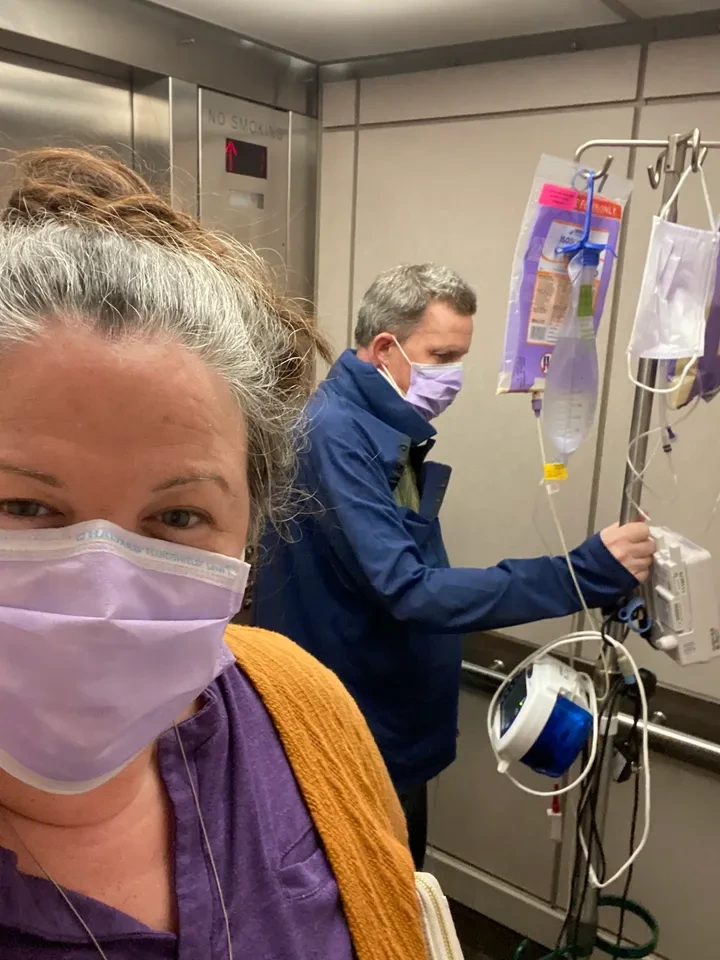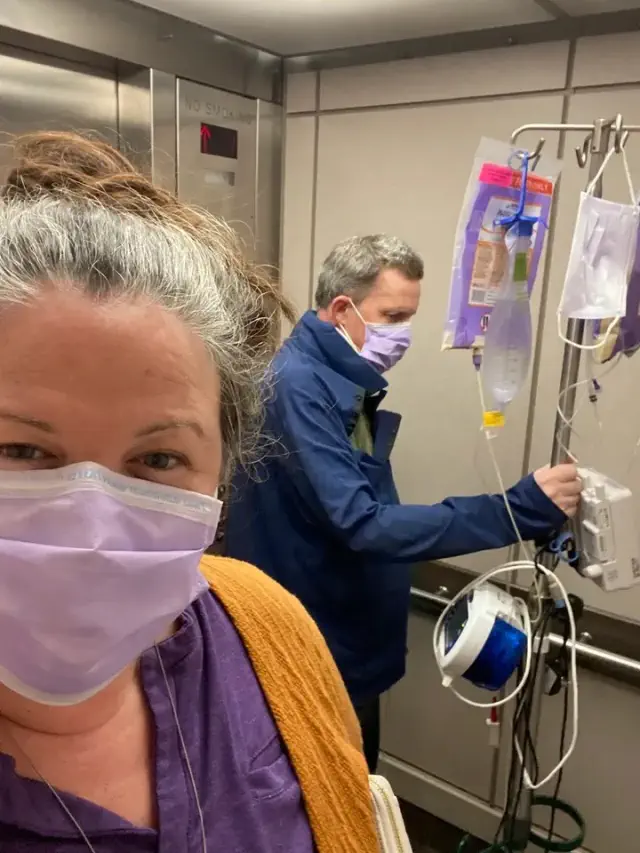"I mentioned to her that I wanted to arrange for a feeding tube, anticipating her full empathy and support. To my surprise, she just laughed."

View pictures in App save up to 80% data.
Shortly after 7:30 a.m., I clicked “send” on an email directed to the radiologist, physician's assistant, and radiation nurse who were caring for my husband.
Last week, he wasn't prepared to discuss the possibility of a feeding tube. However, he has changed his mind and is now in urgent need of one. He is unable to eat and hasn't consumed any fluids for the past 48 hours. Swallowing water has become too painful for him, and he has consented to the placement of the tube. Please provide guidance.
By that stage in his cancer treatment, my husband Gavin had shed a significant amount of weight. He initially believed that opting for a feeding tube signified defeat. However, in due course, he came to understand that receiving nutrition through a tube inserted into his stomach was a far better alternative than the alternative of not being alive.
As Monday morning arrived, we prepared ourselves to leave the house for an important discussion with his physician’s assistant. Gavin shuffled along, struggling to keep his eyes open. The heavy sedation from the painkillers he was taking to manage the severe discomfort from radiation therapy weighed him down, but the harsh reality was that he was also fighting for his life.
Adrenaline surged through my veins. The morning unfolded like any other. A technician checked his vitals, and soon we were guided into an examination room. Gavin and I settled onto a bench adjacent to the staff desk. However, today was different; he lacked the strength to remain upright. Instead, he reclined and rested his head on my lap.
The physician’s assistant entered the room and glanced at Gavin. Once she settled into her chair, I immediately expressed my desire to arrange a feeding tube for him, anticipating her full support and empathy. To my surprise, she burst into laughter.
"I suggested a consultation for a feeding tube last week, but you turned it down," she said with irritation. "Now I need to begin all over again and contact the GI team to figure out how we can arrange for his appointment."
I stood there, mouth agape, utterly confused as I gazed at her.
"I wasn't prepared last week. But now, I'm all set," Gavin murmured, his voice barely above a whisper.
“What was that he said?” the physician’s assistant growled.
I quietly echoed Gavin's words, feeling my heart shatter for him as anger surged through me.
"Congratulations, you've really complicated my work. Now I need to figure out how to assist you. Expect to hear from me soon regarding your next steps, and I strongly suggest you adhere to them. Your attitude might just cost you," she snapped.
I stepped closer, locking eyes with her despite the sharpness in her voice, and replied firmly, “No. Your demeanor is complicating things. It’s truly unwelcome at this moment. He’s suffering, and your responsibility is to assist us. Remember, you pledged to do no harm, yet what’s happening here is causing harm.”
She remained silent. We locked eyes for a few moments. Gavin took hold of my arm and pressed his lips against it. Then, he gently squeezed my hand.
"Hey," he murmured gently. I turned my gaze towards him. "It's alright. I'll manage," he reassured me.
“Not a chance, Gavin,” I chuckled. “You’re scheduled for a feeding tube today.”
I glanced back at his PA and held my position.
"You'd better pray for some luck and trust that I can pull off a miracle to get him into emergency surgery. It could already be too late for him," she repeated.
“I can hardly believe this,” I said resolutely while assisting Gavin to his feet.
As we exited the room, I refrained from glancing back at the PA. A surge of frustration made me want to shout down the corridor, yet I kept my voice in check while assisting Gavin as he painstakingly made his way to the lobby, moving slowly like a tortoise since he struggled to walk and stubbornly declined to use a wheelchair.
I assisted him into one of the reclining chairs, and he dozed off almost instantly. To soothe my nerves, I practiced deep breathing and made myself yawn. After some time, a radiation technician arrived to take him for his treatment.
In an instant, I glanced up to find Gavin in a wheelchair, new gauze snugly secured around his neck. He was once again asleep. The technician informed me that Gavin had experienced a panic attack inside the radiation machine, necessitating the administration of anti-anxiety medication before proceeding. The rest of the day, he was like a ghost, unable to walk or speak. I made sure he arrived at his appointments for bloodwork and infusion, remaining vigilant, anxiously anticipating a call from the physician’s assistant regarding his feeding tube. But the call never came.
A member of the hospital staff assisted me in getting Gavin settled into the car, and once we arrived home, I guided him to the couch. It was the first time that day I opened the fridge to grab something to eat when my phone rang. It was the nurse from the radiology department, who had consistently been supportive and kind to us. She informed me that she had consulted with the entire team, including the physician's assistant, and that the radiologist had arranged for Gavin to be taken to the emergency room for his feeding tube.
“Right now?” I questioned, glancing over at Gavin, who was slumped unconscious on the couch.
“At this moment, we’ve already informed the emergency room about your arrival and arranged for Gavin’s feeding port surgery to be scheduled as soon as they have an opening. According to the team’s update earlier, it’s crucial for Gavin to be seen quickly,” she explained.
I placed Gavin back in the car and we made our way to the hospital once more, arriving in under an hour. We were quickly taken into a treatment room, and just moments later, he was connected to a monitor. His blood was drawn, a saline solution was being administered through one arm, while powerful medications were introduced through the other. Preparations were also underway for him to undergo a CT scan.
The latest medications transformed him into quite the talker, but a side effect from radiation caused him to produce thick strands of mucus in his mouth, making it impossible for anyone to comprehend his words except for me. The nurse provided him with a motorized suction device, but it proved ineffective. Eventually, he stopped attempting to communicate verbally, and whenever someone posed a question, he would gesture towards me to answer on his behalf.
The attending physician in the emergency room entered to inform me that the CT scan results were unremarkable, and I had brought him in right at the crucial moment. A chill ran down my spine as I inquired what he meant by "just in the nick of time."
The world blurred around me as I discovered that Gavin's white blood cell count was alarmingly low, his immune system indicators even more concerning, and had he not been admitted, his body would likely have begun to fail.
The attending physician gave me a quick nod and a reassuring smile, letting me know that Gavin was in good hands and everything would be okay. I took a deep breath, managed a smile in return, and tried to calm my nerves.
Soon after, Gavin was taken to the hospital's long-term cancer care unit. I trailed behind as a staff member wheeled his hospital bed down the corridor. Standing outside his room, I watched the nurse assist him in getting settled and connecting him to an oxygen machine. I requested additional blankets and a pillow, then settled into the recliner to make myself comfortable.
For the next eight days, the recliner in his tiny hospital room transformed into my workspace and sleeping quarters. From that seat, I navigated healthcare choices while observing shocking conduct from the medical staff as my husband fought to communicate, swallow, stand, and occasionally even draw a breath.
I had hoped that being hospitalized would provide us a break from his physician’s assistant. Although we didn't encounter his usual radiologist or any other team members, the physician’s assistant made an appearance in Gavin’s room the morning after his admission, chastising him for not attending his radiation session earlier that day. The following day, she found amusement in his discomfort when he mentioned that the way she dressed his neck wound caused him pain. To top it off, she outright refused to arrange for his anti-anxiety medication to be provided in liquid form for his feeding tube, claiming it would be “too difficult to obtain.” Instead, she continued to insist that he simply swallow it, arguing that he had stronger pain relief available.
After overhearing her speak poorly of him to a nurse and a member of the palliative care team outside his room, I reached my breaking point. I confidently strode past the trio and headed straight for the patient advocate’s office.
I asked for the physician’s assistant to be taken off Gavin’s case right away.
I asked that only one staff member be allowed in his room at any given time.
I requested that the doctors communicate with me rather than with him.
I received a document to sign indicating that I had the authority to speak on Gavin's behalf. Following that, all my recommendations were approved and implemented. To my surprise, the liquid anti-anxiety medication arrived for him the very next morning.
Upon his discharge from the hospital, he had 10 additional radiation treatments and two more chemotherapy sessions remaining. Meanwhile, I was far from finished in my efforts to support him and fight for what he needed.
We Appreciate Your Assistance
While many news organizations have opted to implement paywalls, HuffPost stands firm in the belief that journalism should be accessible to all without charge.
Can't afford to contribute? Support HuffPost by creating a free account and log in while you read.
You've supported HuffPost before, and we'll be honest — we could use your help again. We view our mission to provide free, fair news as critically important in this crucial moment, and we can't do it without you.
Regardless of whether you donate once or multiple times, we are grateful for your support in ensuring our journalism remains accessible to everyone.
You've supported HuffPost before, and we'll be honest — we could use your help again. We view our mission to provide free, fair news as critically important in this crucial moment, and we can't do it without you.
Whether you choose to make a one-time contribution or decide to support us on a regular basis, we are grateful for your role in helping us maintain free journalism for everyone.
Already contributed? Log in to hide these messages.
Gavin has been eight months out of treatment, and thankfully, there have been no signs of recurrence. Before taking on the role of Gavin's advocate and caregiver, I thought advocacy simply involved seeking a second opinion or making sure he received the correct medication. However, it never occurred to me that I would need to stand up for my husband, who is battling cancer, to ensure he was treated with dignity until I found myself in a meeting with the patient advocate manager, going over his rights as a patient.
I felt fortunate to be there and advocate for my husband when he couldn't voice his needs. It’s hard to think about the countless patients who don’t have that support. At the very minimum, everyone deserves to be treated with compassion and understanding, without having to struggle for it.










